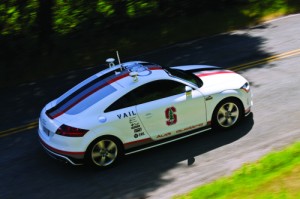
The aerial hazards of making an Audi TT commercial resulted in one serious injury.
A helicopter tracking a driverless Audi TT on a Pikes Peak run crashed this morning, critically injuring the pilot and causing non life-threatening injuries to three other airborne passengers. The Audi escaped unscathed.
The crash happened close to the top of the 14,110 foot peak south of Denver Colorado and indefinitely shut down a tourist rail link to the summit.
Presumably the accident was caused by either equipment failure or pilot error based on my experience after decades of reading aviation accident reports. However, that won’t be known until the National Transportation Safety Board releases a preliminary or final accident report, which given the work practices of U.S. Government agencies will be months or much longer in the making.
It was at earlier Pikes Peak Hill Climbs, of course, that Audi demonstrated its four-wheel-drive prowess a generation ago. Audi rally cars, starting with the S1 quattro (sic), used the all-wheel-drive technology to win the 12.42-mile “Race to the Clouds.” The drivers of those quattro rally cars – Bobby Unser, Walter Roehrl and Michele Mouton – earned places in motorsports history at Pikes Peak.
Audi was looking to borrow some of that glory for its new TT model. It announced with a flourish in June the “Pikes Peak Autonomous Audi TTS” that would allow a car to complete a driving course without a human behind the wheel. The partners in developing this technology – the Stanford University Dynamic Design Lab (DDL), the Electronics Research Lab (ERL) for the Volkswagen Group in Palo Alto, Calif., and Oracle – chose the part-pavement, part-gravel route of the Pikes Peak race to prove the project’s capabilities.
The TT itself has a less than stellar record on the road. The original model, after a series of high speed accidents, was derisively named the “Topsy Turvy” by critics. Testing ultimately revealed that the aerodynamics on the car was flawed due to its design. It generated lift at higher speeds – a good thing in an airplane, quite the opposite in a sports car.
Audi released a statement this afternoon that said it wad “saddened by the helicopter incident that took place this morning near the summit of Pikes Peak.”
It went on to say that all research activities on Pikes Peak have been suspended and the project will continue at a later date.
“Our aim from the start has been to show how the future of driver assistance technologies will lead to dramatic improvements in traffic safety and saving lives,” said Dr. Burkhard Huhnke, Executive Director, ERL when the project was announced.
